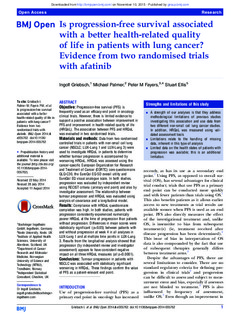Is progression-free survival associated with a better health-related quality of life in patients with lung cancer? Evidence from two randomised trials with afatinib
Journal article, Peer reviewed
Permanent lenke
http://hdl.handle.net/11250/2365349Utgivelsesdato
2014Metadata
Vis full innførselSamlinger
Sammendrag
Objective: Progression-free survival (PFS) is frequently used as an efficacy end point in oncology clinical trials. However, there is limited evidence to support a positive association between improvement in PFS and improvement in health-related quality of life (HRQoL). The association between PFS and HRQoL was evaluated in two randomised trials.
Materials and methods: Data from two randomised controlled trials in patients with non-small cell lung cancer (NSCLC; LUX-Lung 1 and LUX-Lung 3) were used to investigate HRQoL in patients to determine whether tumour progression is accompanied by worsening HRQoL. HRQoL was assessed using the cancer-specific European Organization for Research and Treatment of Cancer (EORTC) core questionnaire QLQ-C30, the EuroQol EQ-5D overall utility and EuroQol EQ visual analogue scale. In both studies, progression was evaluated by independent review using RECIST criteria (primary end point) and also by investigator assessment. The relationship between tumour progression and HRQoL was evaluated using analysis of covariance and a longitudinal model.
Results: Compliance with HRQoL questionnaire completion was high. In both studies, patients with progression consistently experienced numerically poorer HRQoL at the time of progression than patients without progression. Differences in mean scores were statistically significant (p<0.05) between patients with and without progression at week 4 in all analyses in LUX-Lung 1 and at multiple time points in LUX-Lung 3. Results from the longitudinal analysis showed that progression (by independent review and investigator assessment) appears to have consistent negative impact on all three HRQoL measures (all p<0.0001).
Conclusions: Tumour progression in patients with NSCLC was associated with statistically significant worsening in HRQoL. These findings confirm the value of PFS as a patient-relevant end point.
